Happy Columbus Day/Indigenous Peoples Day!
Because of the Columbus Day/Indigenous Peoples Day holiday, this is the last issue of Shelf Awareness until Tuesday, October 13. See you then!
Because of the Columbus Day/Indigenous Peoples Day holiday, this is the last issue of Shelf Awareness until Tuesday, October 13. See you then!
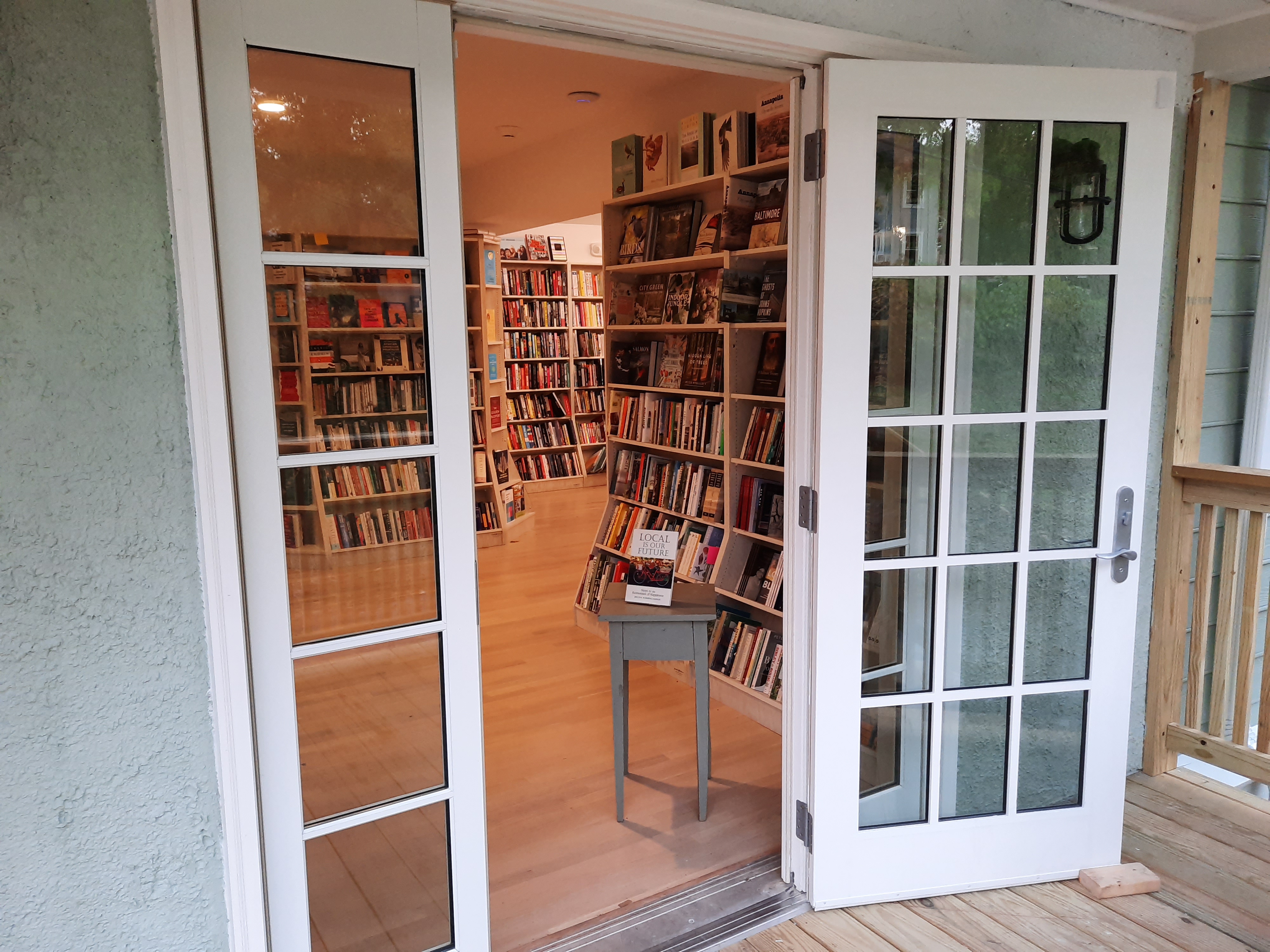 The Ivy Bookshop, Baltimore, Md., has opened in its new, larger location, a move postponed for several months by the Covid-19 pandemic. "We made it!" the store wrote on Facebook. "Our drywall-dusted, paint-spattered, paper-cut selves have missed you deeply, and The Ivy Bookshop is ready to open our new doors and welcome you to our new location."
The Ivy Bookshop, Baltimore, Md., has opened in its new, larger location, a move postponed for several months by the Covid-19 pandemic. "We made it!" the store wrote on Facebook. "Our drywall-dusted, paint-spattered, paper-cut selves have missed you deeply, and The Ivy Bookshop is ready to open our new doors and welcome you to our new location."
Tomorrow the store will begin offering private browsing sessions and curbside pickup, and starting Saturday, October 17, it will offer "special weekend activities on our covered patio and across our gardens." According to the Baltimore Sun, a coffee bar will open later this fall, "with help from the store's sister outpost, Bird in Hand."
More than a year ago, owner Emma Snyder had announced the move to the former site of the Divine Life Church, which has about 2,700 square feet of space, plus a basement, and nearly 2.5 acres of outside grounds. Ivy Bookshop completely renovated the space.
Last year, Snyder said that the first floor will be a traditional bookstore and include a coffee bar; the second floor will be a multi-functional space for workshops, yoga classes, summer camps and more; the upper floor will be a studio apartment for a writing residency; and the outdoor grounds, including meditation gardens, will eventually be a site for outdoor concerts, theater performances, salon dinners, etc.
 Although the Frankfurt Book Fair won't take place in the usual way next week, organizers have arranged for an extensive virtual program that includes panels and seminars addressing topics of great interest to booksellers. (Most events require only that a viewer register with the book fair.) Among them:
Although the Frankfurt Book Fair won't take place in the usual way next week, organizers have arranged for an extensive virtual program that includes panels and seminars addressing topics of great interest to booksellers. (Most events require only that a viewer register with the book fair.) Among them:
"Selling Political and Social Justice Books in the U.S." will take place on Monday, October 12, noon-1 p.m. Eastern. Part of the 20-20 Vision program and sponsored by Books Across Borders (the former Bookselling Without Borders), the panel will focus on the rise of political publishing and social justice handselling in the U.S. from 2016 to the present and beyond. Panelists are a sterling group of booksellers and publishers: Ramunda Lark Young of MahoganyBooks, Washington, D.C., Cristina Rodriguez of Deep Vellum Bookstore, Dallas, Tex., Jeff Deutsch of the Seminary Co-op Bookstore and 57th Street Books, Chicago, Ill., John McDonald of Haymarket Books and Anne Rumberger of Verso Books. The panel is moderated by Shelf Awareness's own John Mutter.
On Monday, October 12, 10-11 a.m. Eastern, the Meet the Editors: An Hour with U.S. Editors panel features editors from large and small publishing houses in the U.S. on the process of acquiring books in translation, what they are looking for, and how they are making acquisitions decisions. The editors are: Juan Milà of Harper Via, Peter Blackstock of Grove Atlantic, Gabriella Page-Fort of Amazon Crossing, Michael Reynolds of Europa Editions, John Siciliano of Penguin Classics, Michael Wise of New Vessel Press, Jenna Johnson of Farrar, Straus & Giroux, Lauren Wein of Avid Reader Press/S&S, Nathan Rostron of Restless Books and Kendall Storey of Catapult Books.
On Tuesday, October 13, 8-9 a.m. Eastern, the European and International Booksellers Federation is holding "Towards a Greener Book Sector," which will focus on how to make the book chain more environmentally friendly. Panelists include Meryl Halls, managing director of the Booksellers Association of the United Kingdom & Ireland; Maria Edsman, CEO of Bokhandelsgruppen (Sweden); Neil Springall, head of operations at Penguin Random House UK; Mathijs Suidman, commercial director of media distribution of the Centraal Boekhuis (Netherlands); and Frédérique Massot, president of the committee for sustainable development at SLF (the French independent bookstore association). Participation is free but registration is required.
EDItEUR's 42nd annual International Supply Chain Seminar will take place on Tuesday, October 13, 7-11 a.m., Eastern time. Usually held in Frankfurt the day before the book fair, the seminar this year is a free online event and focuses on book, e-book and audiobook metadata. Speakers include John Bell of HarperCollins on EDItX reporting; Wei Dai of MVB on the metadata supply chain in Brazil and Mexico; Michael Gordon Smith of the Australian Publishers Association on migration to ONIX 3.0; Patrick Joly of BTLF on a study of the effect of metadata on sales; Martin Klopstock of Kogan Page on e-book accessibility; Andrew MacEwan of the British Library on kickstarting the use of ISNI; Peter Mathews, an independent consultant, on building a metadata capability directory; and Carl Torstensson of StoryTel on implementing Thema and other audiobook metadata. Register via Eventbrite.
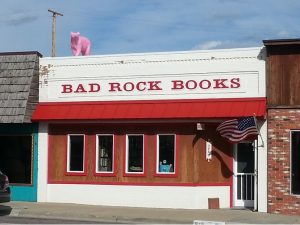 Cindy Ritter, owner of Bad Rock Books in Columbia Falls, Mont., has launched a GoFundMe campaign to raise $14,000 after a water leak was discovered under the bookshop's building. Water service had to be turned off to prevent additional damage and currently the building has no water.
Cindy Ritter, owner of Bad Rock Books in Columbia Falls, Mont., has launched a GoFundMe campaign to raise $14,000 after a water leak was discovered under the bookshop's building. Water service had to be turned off to prevent additional damage and currently the building has no water.
The fundraising page for the bookstore, which carries new books of local interest and by local authors, as well as a wide variety of used books and book-related merchandise, noted that "the mandatory COVID shutdown already challenged Cindy, forcing her to close for 10 weeks. The store reopened but with only limited hours and days. Still, she's managed to hang on and survive. But this water leak could force her to close permanently.... When supporters reached out to Cindy to offer help, she was deeply moved, saying, 'My heart feels like it's being hugged.' "
Author Leslie Budewitz said Ritter "has been a big supporter of the local writing community; her store is truly community-based. Both the Authors of the Flathead and Montana Women Writers, two small multi-genre writers' organizations, are helping spread the word."
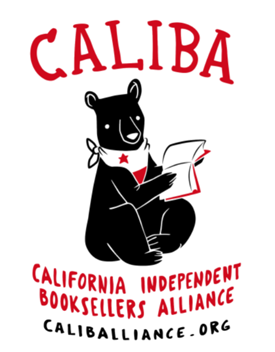 CALIBA president Melinda Powers of Bookshop Santa Cruz kicked off Monday afternoon's Discovery Lab programming by introducing Natalie Baszile, who shared her forthcoming book, We Are Each Other's Harvest: Celebrating African American Farmers, Land, and Legacy (Amistad, April 2021).
CALIBA president Melinda Powers of Bookshop Santa Cruz kicked off Monday afternoon's Discovery Lab programming by introducing Natalie Baszile, who shared her forthcoming book, We Are Each Other's Harvest: Celebrating African American Farmers, Land, and Legacy (Amistad, April 2021).
The book, filled with gorgeous full-color photographs, testimonials, essays and poetry, is "celebratory even as it explores challenging themes," said Baszile, many of which she explored in her novel Queen Sugar, now an OWN TV series. "I've always been interested in the story of Black farmers," Baszile explained. "Part of that is my love of farming and gardening and being connected to the earth." While Queen Sugar explored her Southern roots on her father's side, this book pays homage to her mother's side, to Baszile's maternal great-great grandfather, Mack Hall, born in 1845. "After emancipation, he was a beekeeper, a merchant and a farmer who owned almost 600 acres of land near Tuskegee, Alabama."
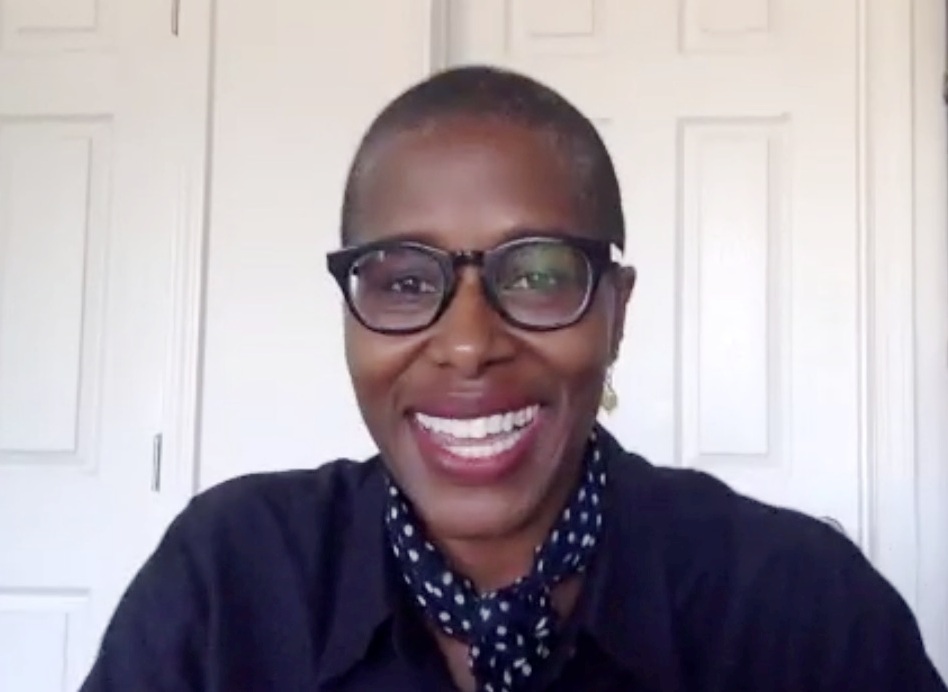 |
|
| Natalie Baszile | |
The author took her title from the last lines of Gwendolyn Brooks's poem "Paul Robeson": "We are each other's/ harvest:/ we are each other's/ business:/ we are each other's/ magnitude and bond." With this book, Baszile said, she wanted to give some context to land ownership and land stewardship. While most people think of farmers as middle-aged white men, she continued, "Our story of the connection to the land is just as deep." It stretches back to emancipation, with the story of General Sherman's Field Order No. 15, "which most of us know as 40 acres and a mule."
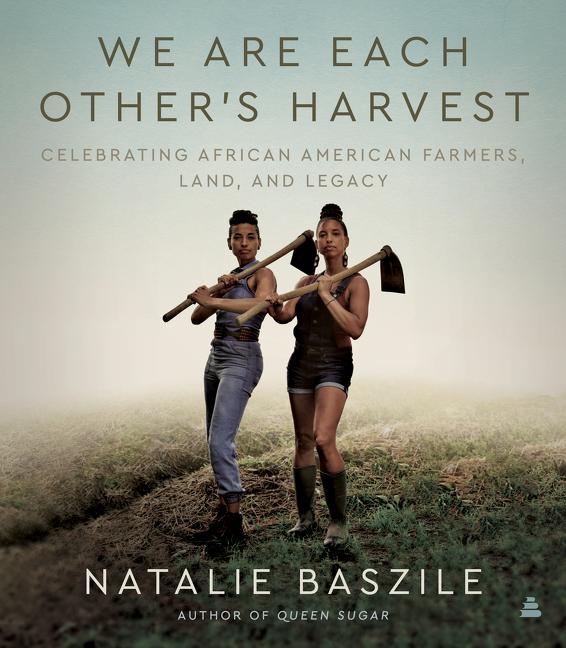 As General Sherman approached Atlanta, Secretary of War Edwin Stanton met with 20 Black ministers and asked them, "What do you want for your people, following the war?" Garrison Frazier, who was a slave until 1857, when he bought his own freedom and that of his wife, was one of those ministers. He said the best way they can take care of ourselves is to have land "and turn it and till it by our own labor." More than 400,000 acres of the coastline from South Carolina to Georgia to Florida was divided into 40-acre parcels and settled by formerly enslaved people. "That settlement, that early ownership resonates today," Baszile said. "By 1920, there were almost one million Black farmers. That number dwindled to 45,000 Black farmers within the last century. What has happened since the 1920s to contribute to that decline in land ownership?"
As General Sherman approached Atlanta, Secretary of War Edwin Stanton met with 20 Black ministers and asked them, "What do you want for your people, following the war?" Garrison Frazier, who was a slave until 1857, when he bought his own freedom and that of his wife, was one of those ministers. He said the best way they can take care of ourselves is to have land "and turn it and till it by our own labor." More than 400,000 acres of the coastline from South Carolina to Georgia to Florida was divided into 40-acre parcels and settled by formerly enslaved people. "That settlement, that early ownership resonates today," Baszile said. "By 1920, there were almost one million Black farmers. That number dwindled to 45,000 Black farmers within the last century. What has happened since the 1920s to contribute to that decline in land ownership?"
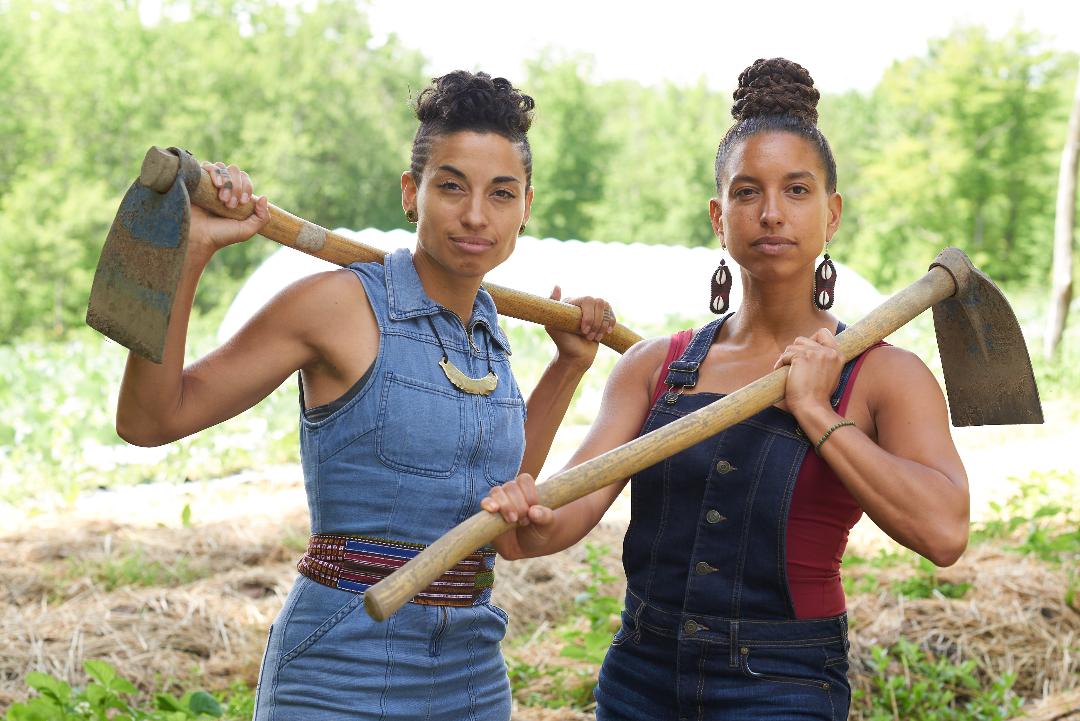 |
|
| Leah and Naima Penniman, co-founders of Soulfire Farm in upstate New York (photo: Alison Gootee) |
|
Baszile noted that Black land loss has been the subject of numerous publications. Pete Daniel wrote Dispossession: Discrimination Against African American Farmers in the Age of Civil Rights (University of North Carolina Press), about the historical role that the U.S. Department of Agriculture has played in disenfranchising Black farmers in the last century. Baszile bought the rights to include in her book "Kicked Off the Land" by Lizzie Presser (which ran in the New Yorker in July 2019)--the story of the Reels brothers in North Carolina, who spent eight years fighting their case in jail to try to protect their land. Black Americans, after Reconstruction, were suspicious of the U.S. government; they did not want to set up trusts and wills. Their land was distributed to their heirs and heirs of heirs. "So now that land was held by hundreds of cousins," Baszile said. "Speculators use loopholes in the law to force the sale of this land. Along the coast of South Carolina and Georgia are now places like Hilton Head, built on land once held by Black families."
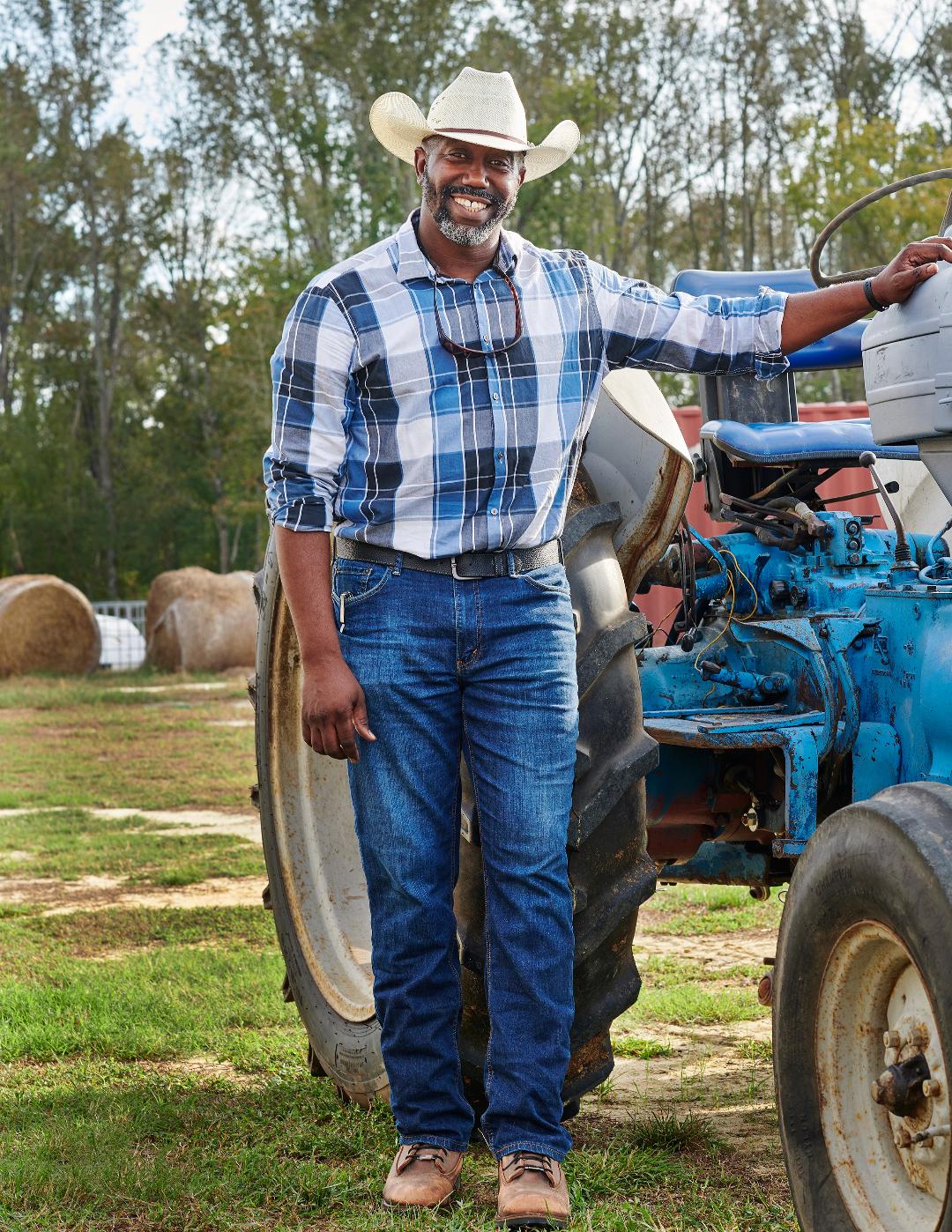 |
|
| Marvin Frank, a retired special forces vet-turned-farmer. (photo: Alison Gootee) |
|
Baszile also includes in her book pieces by Elizabeth Alexander, Ross Gay and Robin Coste Lewis and Michael Twitty, author of The Cooking Gene: A Journey Through African American Culinary History in the Old South. A conversation with Jason Wilborn, one of the writers on the Queen Sugar series, who had his own connection to farming, was crafted into an essay included in her book.
Alison Gootee and Malcom Williams and Baszile traveled all around the country in 2019 photographing farmers and interviewing people like Naima and Leah Penniman at the Soulfire Farm in Upstate New York. They call themselves the "returning generation" and are at the forefront of this movement of young farmers leaving urban centers to return to the land, said Baszile.
Marvin Frank, a retired special forces vet, farms as a way to treat his PTSD. He told Baszile of being on the brink of suicide when his father called him back to Florida to help him farm. Frank now farms in North Carolina as "agratherapy" and invites other vets join him.
"COVID has shown us the importance of knowing where our food comes from," Baszile said. "Food sovereignty, food justice, climate change--these are all part of the book, both directly and indirectly." --Jennifer M. Brown, senior editor
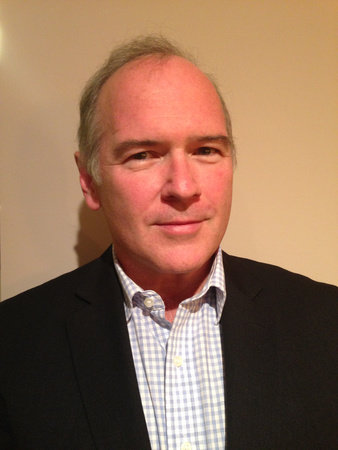 |
|
| Jim Dwyer | |
Jim Dwyer, a Pulitzer Prize-winning reporter, columnist and author "whose stylish journalism captured the human dramas of New York City for readers of New York Newsday, the Daily News and the New York Times for nearly four decades," died October 8, the Times reported. He was 63. Dwyer won the 1995 Pulitzer for commentary for columns in New York Newsday, and was part of a team at the newspaper that won the 1992 Pulitzer for spot news reporting for coverage of a subway derailment in Manhattan, the Times wrote, adding that "colleagues called Dwyer, who worked for six metropolitan dailies and wrote or co-wrote six books a fast, accurate and prolific writer who crusaded against injustice."
His books include More Awesome Than Money: Four Boys, Three Years, and a Chronicle of Ideals and Ambition in Silicon Valley (2015); False Conviction: Innocence, Science and Guilt (2014); Actual Innocence: Five Days to Execution and Other Dispatches from the Wrongly Convicted (2000, with Peter Neufeld & Barry Scheck); 102 Minutes: The Untold Story of the Fight to Survive Inside the Twin Towers (2005, with Kevin Flynn); Two Seconds Under the World (1994, with Dee Murphy, David Kocieniewski & Peg Tyre); and Subway Lives: 24 Hours in the Life of the New York Subways (1991).
Since 2007, Dwyer had written the Times's "About New York" column, succeeding a distinguished line of writers, including Meyer Berger, David Gonzalez and Dan Barry, the Times noted. In a 2016 interview with the Columbia Journalism Review, Dwyer was asked if he had the best job in journalism. He replied: "I believe I do. A big part of my job is to talk with brilliant scientists, great artists, the amazing people you meet just walking around the streets of New York. What could be more fun than that?"
In his last Times column, on May 26, he linked the Covid-19 pandemic to his family's history and the catastrophic 1918 flu: "In times to come, when we are all gone, people not yet born will walk in the sunshine of their own days because of what women and men did at this hour to feed the sick, to heal and comfort."
 What could be better than a book gathering? Why, a Dogs & Books gathering, of course! Every Thursday evening, Dogs & Books hosts "Yappy Hour" for all things books and dogs. Join them on Facebook at dogsnbooks or Instagram @dogbooksyappyhour.
What could be better than a book gathering? Why, a Dogs & Books gathering, of course! Every Thursday evening, Dogs & Books hosts "Yappy Hour" for all things books and dogs. Join them on Facebook at dogsnbooks or Instagram @dogbooksyappyhour.
Pictured (clockwise from top left) are hosts Teresa J. Rhyne, with her beagle Roe; Peter Zheutlin, with Albie, star of The Dog Went over the Mountain; Cara Sue Achterberg, with Gracie and Franny tussling in the background, featured in One Hundred Dogs and Counting; and Poppy relaxing, no doubt exhausted from her debut this week in Rhyne's Poppy in the Wild (all titles from Pegasus).
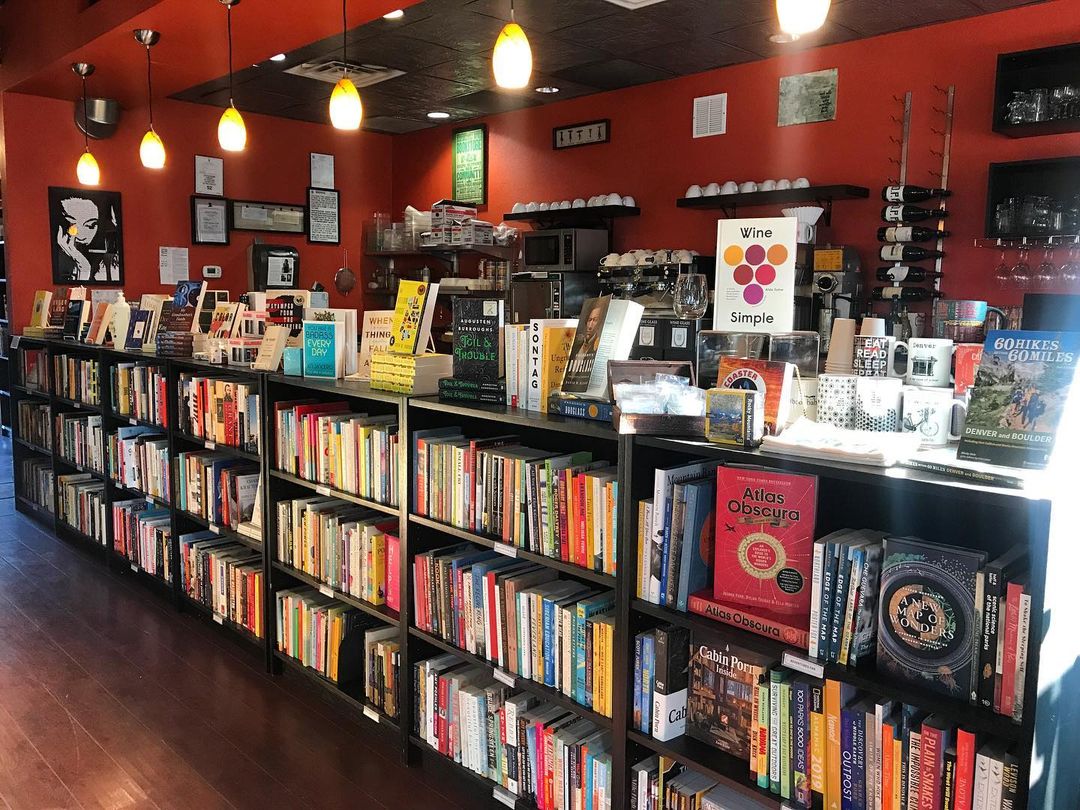 Posted on facebook by BookBar, Denver, Colo.:
Posted on facebook by BookBar, Denver, Colo.:
"It's finally happened. BookBar's bar is made of books. Make your reservation to browse in-store today so you can check it out in all its glory--starting October 11!"
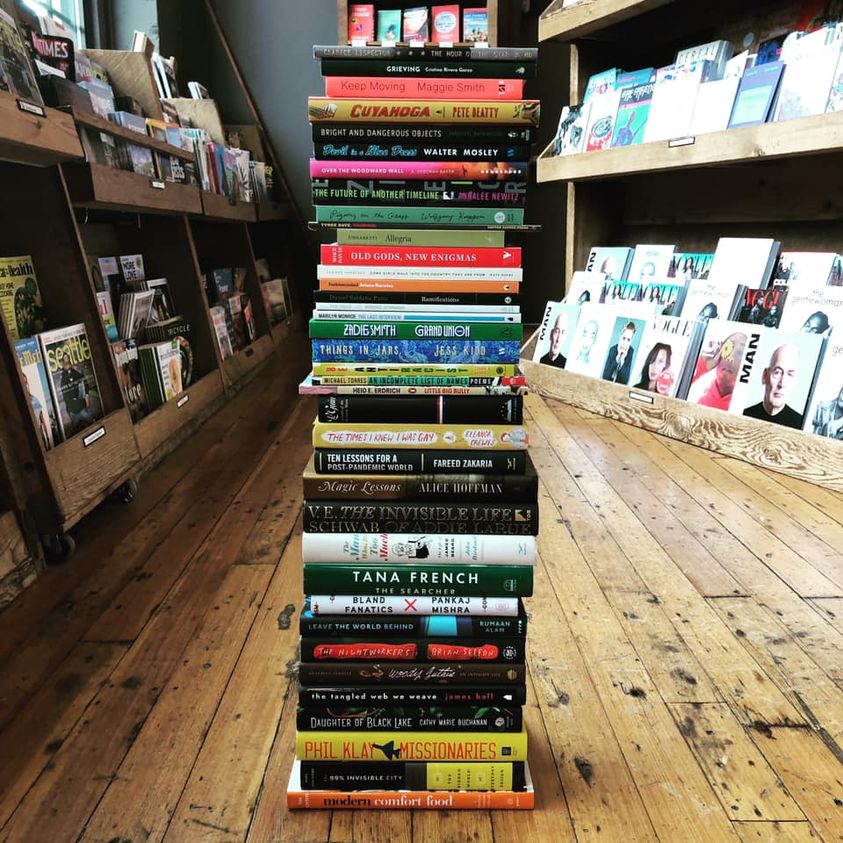 "October is the new December--have you heard?" Elliott Bay Book Company, Seattle, Wash., posted on Facebook. "We're encouraging folks to start their holiday shopping early this year and we certainly have plenty of wonderful books to choose from! These are the titles that are hitting the shelves this week--check out our stories for a closer look."
"October is the new December--have you heard?" Elliott Bay Book Company, Seattle, Wash., posted on Facebook. "We're encouraging folks to start their holiday shopping early this year and we certainly have plenty of wonderful books to choose from! These are the titles that are hitting the shelves this week--check out our stories for a closer look."
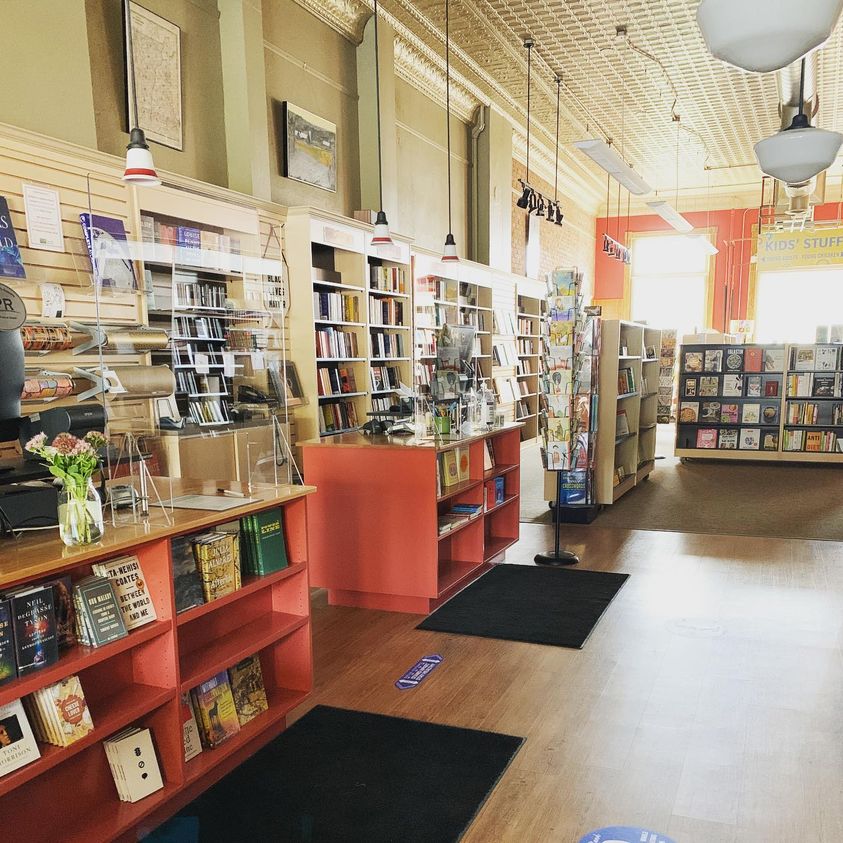 "Spiffy and spacious and cautiously open, today through Saturday, 10-2," Vermont Book Shop, Middlebury, Vt., posted on Facebook Wednesday.
"Spiffy and spacious and cautiously open, today through Saturday, 10-2," Vermont Book Shop, Middlebury, Vt., posted on Facebook Wednesday.
Ariele Fredman has been promoted to senior associate director of publicity at Atria Books. She was formerly associate director of publicity and joined Atria 10 years ago.
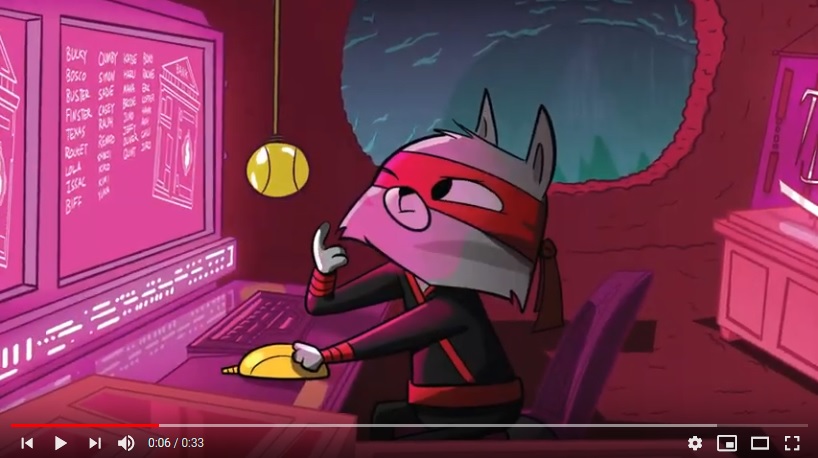 Cat Ninja by Matthew Cody, illustrated by Yehudi Mercado (Andrews McMeel).
Cat Ninja by Matthew Cody, illustrated by Yehudi Mercado (Andrews McMeel).
Today:
NPR's Here & Now: Lenny Kravitz, co-author of Let Love Rule (Holt, $29.99, 9781250113085).
HBO's Real Time with Bill Maher: John Brennan, author of Undaunted: My Fight Against America's Enemies, At Home and Abroad (Celadon, $30, 9781250241771).
Tomorrow:
NPR's Weekend Edition Saturday: Ngũgĩ wa Thiong'o, author of The Perfect Nine: The Epic of Gĩkũyũ and Mũmbi (The New Press, $23.99, 9781620975251).
Monday:
Rachael Ray Show: Danielle Kartes, author of My Very First Cookbook: Joyful Recipes to Make Together! (Sourcebooks Explore, $17.99, 9781728214191)
Shooting is underway for eOne's film Mrs. Harris Goes to Paris, based on Paul Gallico’s novella, Deadline reported. Filming has begun in Budapest before transferring to London and Paris.
Lesley Manville and Isabelle Huppert star in the project, directed by Anthony Fabian from a screenplay adapted by Carroll Cartwright, Fabian and Keith Thompson, with additional writing by Olivia Hetreed. The cast also features Jason Isaacs, Lambert Wilson, Alba Baptista and Lucas Bravo. Deadline noted that eOne will finance and distribute the film with Cofiloisirs providing the credit facility. Support comes from the National Film Institute--Hungary, in collaboration with the House of Dior.
A longlist has been unveiled for the inaugural ARA Historical Novel Prize, which is "designed to give historical novelists the opportunity to be recognized in a class of their own--for the first time ever as part of an Australian and New Zealand literary award," according to the organizers. The shortlist will be announced October 28 and a winner named November 10. The overall prize winner receives A$50,000 (about US$35,190), with an additional A$5,000 (about US$3,520) to be awarded to each of the remaining two shortlisted authors. The longlisted titles are:
Master of My Fate by Sienna Brown
Bodies of Men by Nigel Featherstone
Shepherd by Catherine Jinks
Stone Sky Gold Mountain by Mirandi Riwoe
The Electric Hotel by Dominic Smith
Damascus by Christos Tsiolkas
The Dictionary of Lost Words by Pip Williams
The Yield by Tara June Winch
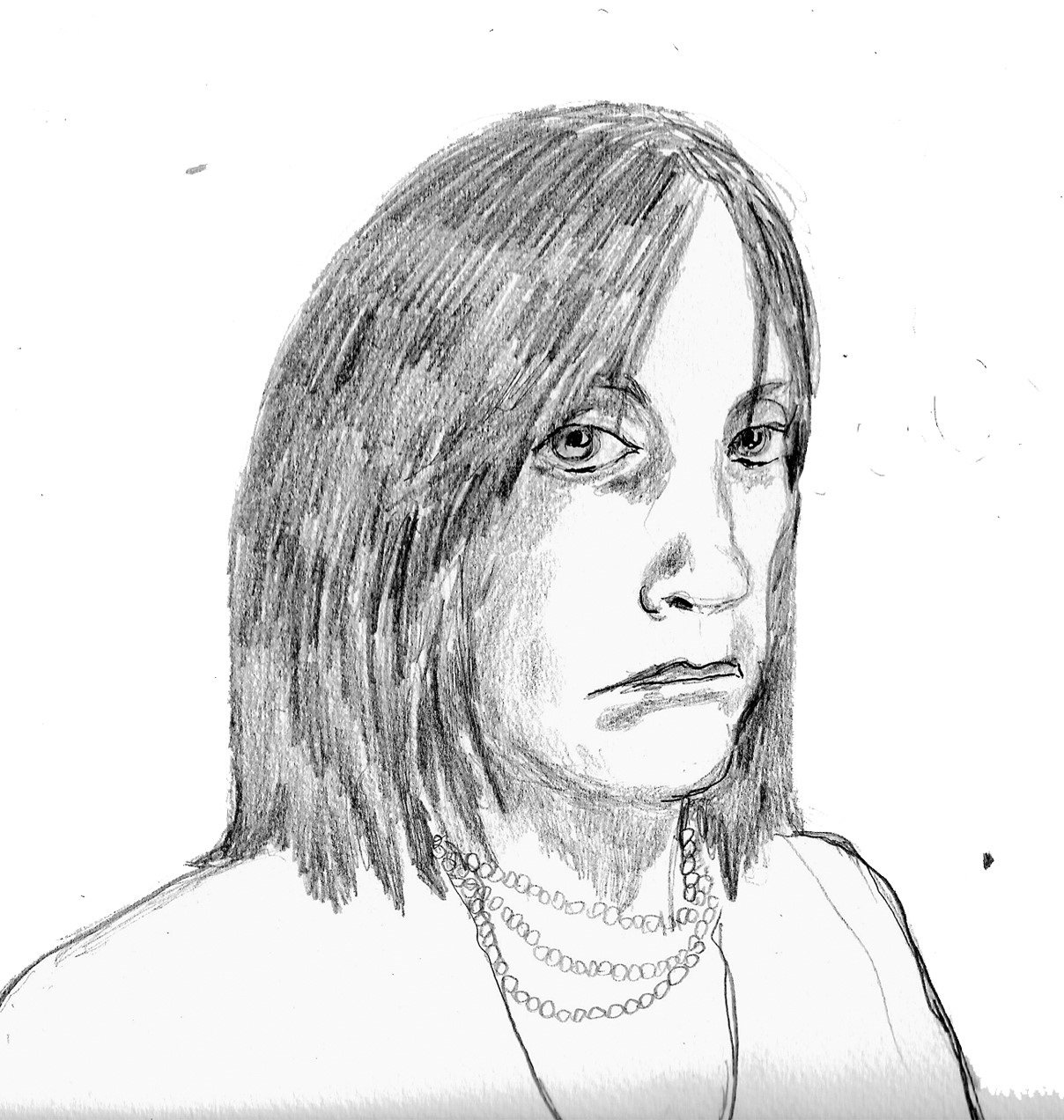 |
|
| image: Merrill Markoe | |
Merrill Markoe is a humorist who has worked in a variety of forms involving film, television and radio in addition to writing a bunch of books of humorous essays and a few novels. She received four Emmys for her work as writer/co-creator of Late Night with David Letterman in the '80s, and in 2020 she received The Paddy Chayefsky Laurel Award from the Writers Guild of America. We Saw Scenery (Algonquin, Oct 13, 2020) is her first graphic novel.
On your nightstand now:
Because I just wrote and illustrated a graphic novel for the first time, I have been studying the work of various people who are good with the form. My favorites are Lynda Barry, Roz Chast, Mimi Pond and Daniel Clowes. But at the moment I am reading Wendy, Master of Art by Walter Scott, which is making me laugh out loud because it so perfectly captures the signature details of going to art school: e.g., the incomprehensible pretentious language and all the non-committal shrugging.
Favorite book when you were a child:
I was a big devotee of the whole Nancy Drew series. I would consume them back to back, so I can't really differentiate between the different titles. When I wasn't reading Nancy Drew, I was reading Mad magazine. In a way, it was Mad magazine that raised me and turned me into me.
Your top five authors:
Since I discovered his work in high school, I have been devoted to Kurt Vonnegut. I love his combination of direct simplicity and wild imagination. Robert Benchley's hilarious essays continue to be my favorite humor writing because of his cerebral approach to the mundane combined with complete off-the-charts silliness. He taught me my favorite way to construct comedy. I also find myself re-reading Dorothy Parker for similar reasons. When I want to relax and be comforted, I read Anne Tyler. When I want to be reminded how cool it is to be creative, I read Lynda Barry.
Book you've faked reading:
Infinite Jest. I read the opening few chapters a number of times and then just couldn't bring myself to go forward. Lately, after reading a couple of stories about the author's bad behavior with women, I gave myself permission to give up caring about reading any more.
Also, A Brief History of Time by Stephen Hawking. I worked on the first few chapters of that for YEARS because my heart loves the idea of learning about physics. I'd diligently sit down to tackle the material, pumped on what a better version of me this knowledge would create. And then I'd wake up the next day.
.jpg) Book you're an evangelist for:
Book you're an evangelist for:
Why Is It Always About YOU: the Seven Deadly Sins of Narcissism by Sandy Hotchkiss. As a child of narcissists who went on to replicate that situation repeatedly by also dating narcissists, I was ahead of the curve in my expertise on this topic.
Book you've bought for the cover:
The Mysteries of Harris Burdick by Chris Van Allsburg. It's another spooky wonder from the man who wrote The Polar Express. Boy, can that guy draw.
Book you hid from your parents:
In the fourth grade, someone passed me a copy of My Wicked Wicked Ways by Errol Flynn. I had no idea who Errol Flynn even was, but I didn't care. He had wicked ways and I wanted in.
Book that changed your life:
Robert Benchley's collected works taught me how to write funny essays. They were written in the 1920s, '30s and '40s. But they still sound contemporary because they trade in human silliness.
Favorite line from a book:
" 'Everything must have a purpose?' said God. 'Certainly,' said man. 'Then I leave it to you to think of one for all of this,' said God."
Cat's Cradle taught me how to de-construct religious thought. And every time I re-read the book, I am so taken by it that I write various lines down so I will remember them. There are so many lines in this book that I love. For example: "Science is magic that works."
Five books you'll never part with:
Lately I buy as many e-books as I can, so I never do have to imagine parting with them. But I can tell you what books I actually did take with me when I had to evacuate my house because of a raging wildfire:
My crumbling and very old copy of The Benchley Roundup
The Life of Birds by David Attenborough
What It Is by Lynda Barry
Book you most want to read again for the first time:
A Tale of Two Cities by Charles Dickens because I really enjoyed it when I read it in high school . But I have had a hard time re-engaging with Mr. Dickens after learning that he had his wife of 20 years, Catherine, committed to a mental institution so he could go off with his much younger mistress. Which reminds me of one of the bigger lessons I have learned in life: strive not to learn too much personal information about the artist. It can really ruin the art.
Three nonfiction books you learned a lot from:
I Like to Watch: Arguing My Way Through the TV Revolution: Emily Nussbaum analyzes aspects of shows I've watched in ways that never occurred to me.
Fantasyland: How America Went Haywire: Kurt Andersen presents longstanding truths about the American psyche in a way that add up to a vision of the United States as a place that has always thrived on and enjoyed being delusional.
The Gift of Fear: Gavin de Becker (a top security expert) teaches readers how to tune into the fear they may feel but have been taught to disregard in the name of self-protection and defense.
Five recent memoirs you enjoyed:
Born a Crime: Trevor Noah grew up in South Africa during apartheid. His story is stunning, he manages to make it funny and he is a very good writer.
Just the Funny Parts: Comedy writer, journalist and all-around MVP Nell Scovell has had every damn writing job under the sun. She remembers EVERYTHING that ever happened to her during her career and knows how to tell it funny.
The Customer Is Always Wrong: Mimi Pond's graphic novel memoir of her days as a waitress attending art school. Astute, beautifully drawn, carefully detailed and funny.
Room to Dream: Written by Kristine McKenna with David Lynch, it's a combination biography and autobiography of David Lynch with the two authors alternating chapters. If you, like me, have a special place in your heart for the metaphysical artsy craziness that is David Lynch, McKenna tells all and leaves no stone unturned.
Me: Elton John: I had no real interest in this story until I started to read it and found it fascinating, very nicely written and funny. I wasn't even a particularly big fan of Elton John until I read this. Now I am.
Bring Me the Head of Quentin Tarantino: Stories by Julián Herbert, trans. by Christina MacSweeney (Graywolf, $16 paperback, 192p., 9781644450413, November 3, 2020)
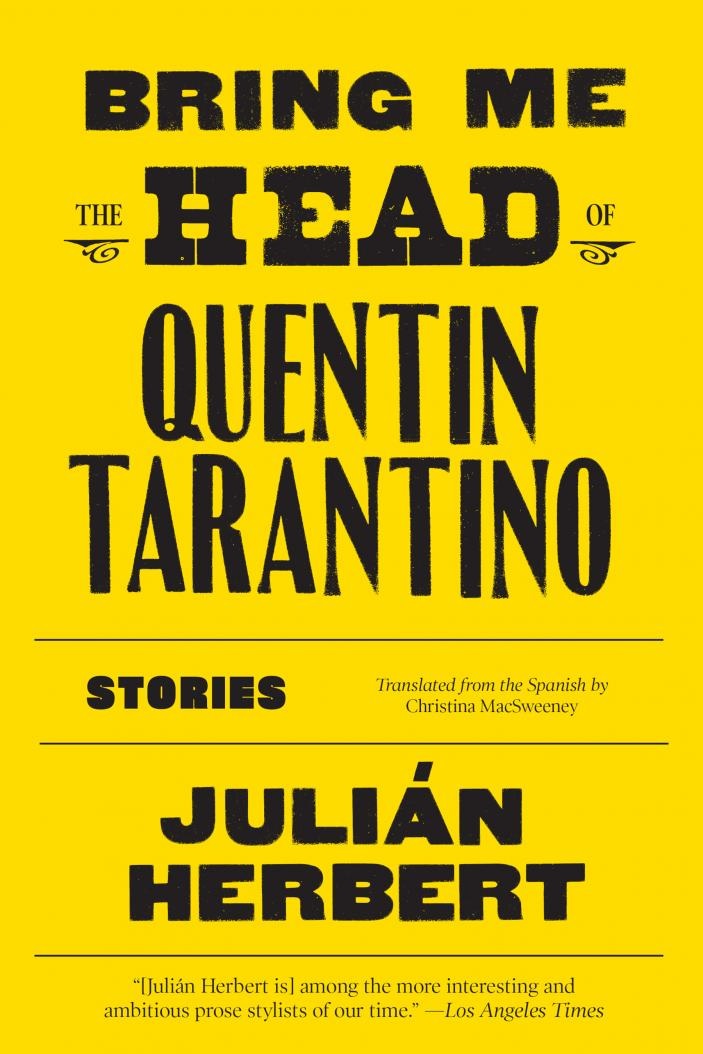 The genre-hopping, award-winning Mexican writer, poet, musician and teacher Julián Herbert made his English-language debut with Tomb Song, an autobiographical novel focused on his relationship with his late mother, a prostitute dying of leukemia. His nonfiction The House of the Pain of Others is a hybrid exploration of the 1911 massacre of more than 300 Chinese immigrants in the Mexican city of Torreón. Violence--especially involving characters on the fringes of society--runs rampant in his latest, the electrifying fiction collection Bring Me the Head of Quentin Tarantino.
The genre-hopping, award-winning Mexican writer, poet, musician and teacher Julián Herbert made his English-language debut with Tomb Song, an autobiographical novel focused on his relationship with his late mother, a prostitute dying of leukemia. His nonfiction The House of the Pain of Others is a hybrid exploration of the 1911 massacre of more than 300 Chinese immigrants in the Mexican city of Torreón. Violence--especially involving characters on the fringes of society--runs rampant in his latest, the electrifying fiction collection Bring Me the Head of Quentin Tarantino.
The impressive assemblage opens and closes with the same sentence: "that thing you call 'human experience' is just a massacre of onion layers." The comparative reasons are graphic, from "nothing tastes so much of blood as a dismembered onion," to additional insistently convincing similarities having to do with spray splatter and fatal crushings. In the first story, "The Ballad of Mother Teresa of Calcutta," the narrator gleefully reveals his "pleasure of depositing a little vomit on those readers who adore straightforward literature." A hack-for-hire, he's just fine with "hijacking the memories and anecdotes of certain clients" when they don't pay, most recently revealing a wayward Pemex executive's nauseating airport encounter with Mother Teresa. In the novella-length, titular last story, another writer--this time, a film critic who insists "the main function of criticism is to misread everything"--is summoned by Jacobo Montaña, "the most wanted man in Mexico," who demands "the head of that f*cking bastard" (yes, Quentin Tarantino) not only for being Montaña's unaware doppelgänger but for stealing what should have been Montaña's own celluloid life. After Montaña sends henchmen Rosendo and Gildardo to Los Angeles armed with an order for decapitation, he keeps the film critic luxuriously imprisoned to provide lessons in Hollywood auteur-ship.
In between, notable narratives are many: a "gonzo-porn-AIDS movies"-creator lauded as a significant conceptual performance artist examines his career while waiting for his HIV-positive co-star to give birth in "NEETS"; fellow Mexican literati Valeria Luiselli gets a dedication plus a nod to her dental-collecting The Story of My Teeth in "Caries," about a toothless-to-be artist. Luiselli, by the way, is not the only notable shadow: Shakespeare, Eliot and Joyce are just a few who appear on the page, along with filmic legends Pedro Almodóvar, Akira Kurosawa and Roland Emmerich. Beyond the death and destruction, Herbert certainly knows how to cultivate erudite narrative company.
Reunited with award-winning translator Christina MacSweeney, Herbert presents 10 stories ready to disturb, quite possibly even disgust. That said, even for the most reluctant readers, the surprisingly immersive humor and slyly playful wit make resistance futile. --Terry Hong, Smithsonian BookDragon
Shelf Talker: Mexican literary chameleon Julián Herbert delivers 10 electrifying stories connected by violence, people on the fringe and--surprisingly--undeniable, irresistible humor.
 The exclamation mark in the title of Monday afternoon's California Independent Booksellers Alliance Discovery Lab presentation ("Meet Bronzeville Books!") was well placed. Executive director Calvin Crosby interviewed author, publisher, Def Comedy Jam alumnus, actor and filmmaker Danny Gardner, whose sense of humor blends seamlessly with his passion for Bronzeville Books. The new indie press is based in Los Angeles and "focused on elevating voices and stories that have long been underrepresented and need to be told." Gardner would like indie booksellers to be part of that effort.
The exclamation mark in the title of Monday afternoon's California Independent Booksellers Alliance Discovery Lab presentation ("Meet Bronzeville Books!") was well placed. Executive director Calvin Crosby interviewed author, publisher, Def Comedy Jam alumnus, actor and filmmaker Danny Gardner, whose sense of humor blends seamlessly with his passion for Bronzeville Books. The new indie press is based in Los Angeles and "focused on elevating voices and stories that have long been underrepresented and need to be told." Gardner would like indie booksellers to be part of that effort.
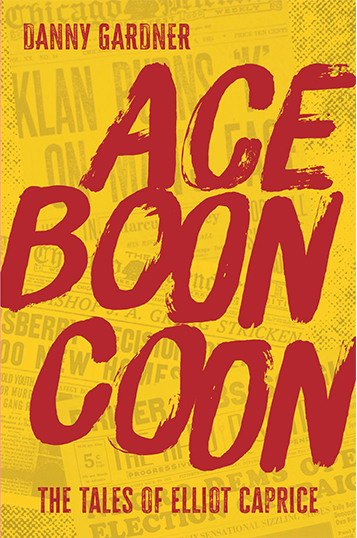 One of the initial Bronzeville Books titles is Ace Boon Coon, the second volume in Gardner's Tales of Elliott Caprice series (he has also acquired the rights to A Negro and an Ofay, his first novel in the series). "It is set in 1953 Chicago. You can even call it once upon a time in Black America," he said. "It covers the period just after the Great Migration up north from the south when African Americans started entering the middle class real big.... My hero is half-Black, half-white, claims Black all the way, knows which side his bread is buttered on and he's a former Chicago police officer.... It's a lot of being neither fish nor fowl. Being both in and of the world and then being able to provide a perspective on current times.... It actually hails back to when we might have figured all this out 50 years ago or so."
One of the initial Bronzeville Books titles is Ace Boon Coon, the second volume in Gardner's Tales of Elliott Caprice series (he has also acquired the rights to A Negro and an Ofay, his first novel in the series). "It is set in 1953 Chicago. You can even call it once upon a time in Black America," he said. "It covers the period just after the Great Migration up north from the south when African Americans started entering the middle class real big.... My hero is half-Black, half-white, claims Black all the way, knows which side his bread is buttered on and he's a former Chicago police officer.... It's a lot of being neither fish nor fowl. Being both in and of the world and then being able to provide a perspective on current times.... It actually hails back to when we might have figured all this out 50 years ago or so."
After recounting the history of the Bronzeville neighborhood in his native city, Gardner spoke about the challenges he faced getting a foot in the door of the publishing world, despite his success in the entertainment industry. "When I began to blow up a little bit with A Negro and an Ofay, I started to meet resistance, but only in the form of artificial market controls. We're just talking about some kind of secretary who's at the other end of the distribution pipeline who just maybe doesn't want to put a book out that says Negro and Ofay."
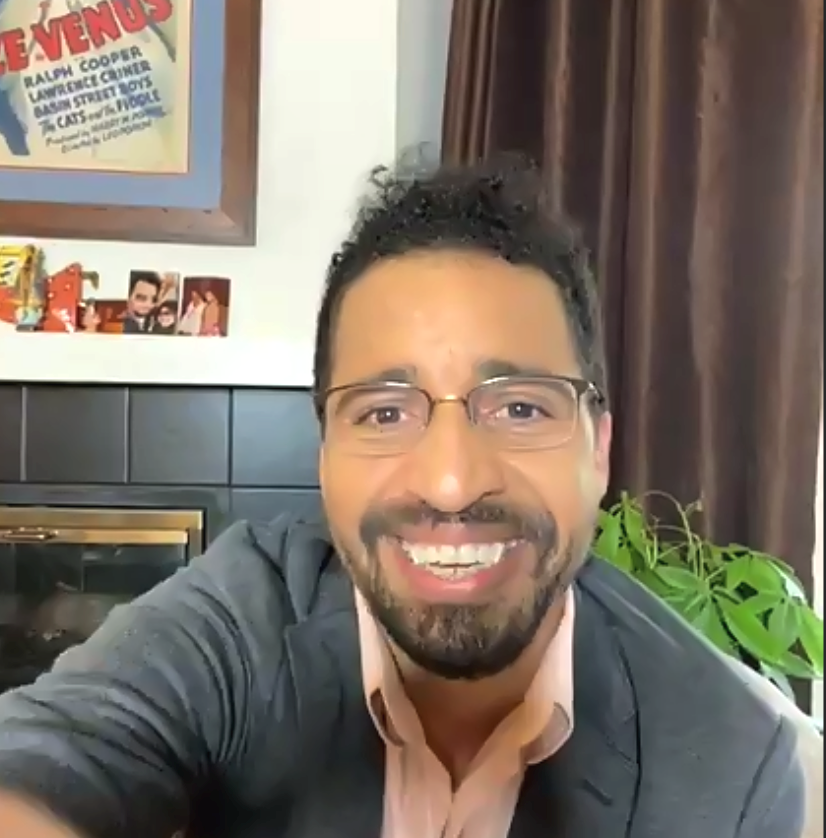 |
|
| Danny Gardner | |
To counter these obstructions, he would buy copies of his own book, go to bookstores "and they sold out of my hand two or three at a time. It seemed to me that there was a situation where I could invest in myself, invest in my own publishing future, because every rejection letter that I got for A Negro and an Ofay didn't say it wasn't a great book; they didn't say they didn't enjoy it. They just said, man we can't invest in you. We don't know what to do with this. We don't know how to provide for your career. We've never put a book out like this one."
Inspired by the hard-won self-sufficiency of Bronzeville's history, Gardner decided "to take care of it on my own the way they did it in Bronzeville.... And so I'm saying, I've paved my own streets already. My books are in the same catalogue as everybody else, I'm shipping at the same price points with the same discounts as everyone else, but I have proven that there is a market for genre fiction that is rooted in African American cultures.... I put good money, good hard time into this. You can believe in this and trust it. I just want to enter the conversation, and you know there's 44 million Black people out there that might have a different idea of what a mystery is, and this might be a little closer to that."
 Gardner hopes to release 20 original titles next year, along with launching the Bronzeville Books Quarterly (BBQ), and "pull up 10 down-and-outers (pay to play) from publishers who want to get their authors to the next level show." The press has also published Nikki Dolson's Love and Other Criminal Behavior, and in December will release Hard Times by Les Edgerton, who "is still at it," Gardner said. "Hard Times is an amazing achievement.... the book that will make people believe that that old lion is still young enough to snatch your face off, man, and I'm proud to publish him."
Gardner hopes to release 20 original titles next year, along with launching the Bronzeville Books Quarterly (BBQ), and "pull up 10 down-and-outers (pay to play) from publishers who want to get their authors to the next level show." The press has also published Nikki Dolson's Love and Other Criminal Behavior, and in December will release Hard Times by Les Edgerton, who "is still at it," Gardner said. "Hard Times is an amazing achievement.... the book that will make people believe that that old lion is still young enough to snatch your face off, man, and I'm proud to publish him."
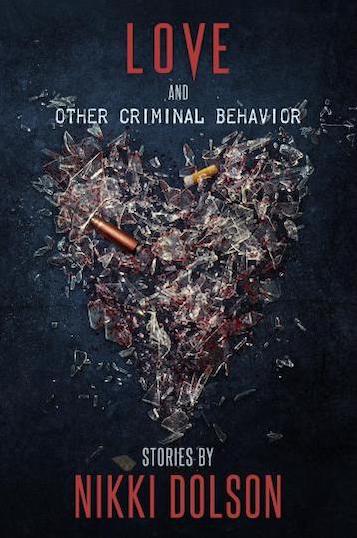 "Every book, every property, every product, every short story, costs you something to create it and it costs you a heart's investment, and that should be worth something at the end of the day, so we take care of the books. We try to find new market opportunities for our authors so that it means more books," Gardner said, adding: "We want to make a difference. I put all my grandkids' inheritance on this thing, so you all just order one of these bad boys, get it shipped to you, read it, see if it touches your heart, and if it does, I'll send you more to sell."
"Every book, every property, every product, every short story, costs you something to create it and it costs you a heart's investment, and that should be worth something at the end of the day, so we take care of the books. We try to find new market opportunities for our authors so that it means more books," Gardner said, adding: "We want to make a difference. I put all my grandkids' inheritance on this thing, so you all just order one of these bad boys, get it shipped to you, read it, see if it touches your heart, and if it does, I'll send you more to sell."
Gardner's passion for marketing, as well as his sharp sense of humor, came through as he emphasized his eagerness to work with indie booksellers: "I'll find creative ways to help. I'm into that kind of stuff. I'm an old solutions kind of cat.... And I'm handsome; I'll bring the books to you. I'll put a suit on, no problem. But I do think we're doing okay and the investment that we've made into printing and broadcasting, it really helps build the market value of every book."
Ultimately, he told CALIBA's booksellers, he would like to know "what makes you all happy with publishers that treat you right and distributors who know where your bottom line is. I'm new. I'm brand new. But I'm going for the gusto.... So come on in. Welcome to Bronzeville. It's really fun in here, man. And it's Black. And y'all know that's kinda mattering right now."